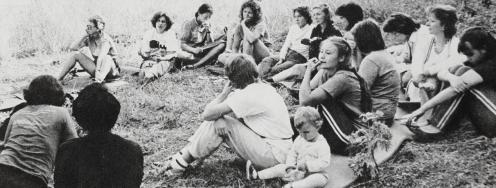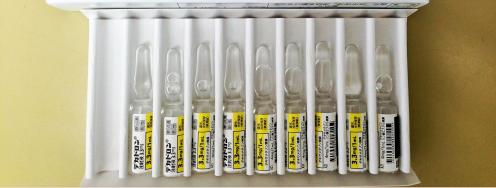140 World Leaders Call for Action on Nuclear Security
On the radar: Next steps for nuclear security; Obama’s disappointing legacy; A Primer on the summits; Lew on overusing sanctions; Nuclear terrorism threat explained; Trump’s national security insanity; and Bombs unsafe in Belgium
A call for prevention of nuclear terrorism - “A Call to Action on Nuclear Terrorism signed by more than 140 global political, diplomatic, business and military leaders, as well as top experts in nuclear security, and released today, cites the progress resulting from four Nuclear Security Summits but warns: ‘The job is not done. The Summits are ending as the terrorist threat is growing.’” Former U.S. Defense Secretary William Perry, former Secretary of State Henry Kissinger, Senator Sam Nunn, former UN Secretary-General Kofi Annan and former President Jimmy Carter are among those who signed the statement.
--“We call on leaders to accelerate the effort to prevent catastrophic nuclear terrorism and continue their work beyond this last Summit to create global standards, accountability and best practices for securing all nuclear materials,” they write. “The United States and Russia, with the vast majority of the world’s nuclear materials and weapons, have a special responsibility to lead... We call upon the two countries to work to prevent ISIS and other violent groups from getting these materials and to avoid another costly arms race.” Full statement here. http://bit.ly/21OYtKk
Obama’s legacy - “Of all the threats to global security and peace, the most dangerous is the proliferation and potential use of nuclear weapons. That’s why, seven years ago in Prague, I committed the United States to stopping the spread of nuclear weapons and to seeking a world without them… We’ve made important progress… We’re taking concrete steps toward a world without nuclear weapons… We’re strengthening the global regime… We’re pursuing a new framework for civil nuclear cooperation,” writes President Obama in The Washington Post.
--“We’re clear-eyed about the high hurdles ahead, but I believe that we must never resign ourselves to the fatalism that the spread of nuclear weapons is inevitable. Even as we deal with the realities of the world as it is, we must continue to strive for our vision of the world as it ought to be.” Full piece here. http://wapo.st/1UDHaND
See also - “Is That All There Is? Obama’s Disappointing Nuclear Legacy,” by Joe Cirincione for Defense One.http://bit.ly/1Valszi
Nuclear Security Summit 101 - “The event is an opportunity to ‘raise awareness of the risk of nuclear terrorism and to secure weapons-usable material in the civilian sector,’ says Kelsey Davenport, the director of nonproliferation policy at the Arms Control Association… Such civilian material makes up only 15 percent of the world's stockpile... [But the summit] allows heads of state and security officials to trade ideas… and gets countries together to announce new security pledges and agreements,” writes Max Rosenthal in Mother Jones.
--“Do these summits actually get anything done? Kingston Reif, the Arms Control Association's director for disarmament and threat reduction policy, says yes; he puts the summits up there with the Iran deal and a 2010 arms-reduction treaty with Russia as Obama's key achievements in the nuclear arena. ‘The summit process has been largely successful in reducing the risk posed by nuclear terrorism,’ he says.” Full story here. http://bit.ly/231EVES
See also - “As Nuclear Security Summit Begins, Materials Remain Vulnerable to Theft,” by David Sanger and William Broad for The New York Times. http://nyti.ms/1MVT9hc
Proper use of sanctions - Speaking at a recent event, U.S. Secretary of the Treasury Jacob Lew warned against “sanctions overreach” — relying too much on sanctions without a broader strategy for achieving foreign policy goals. Video of Lew’s remarks here: http://ceip.org/1pYbeH3
Nuclear security threat explained - An interactive piece from the Carnegie Corporation of New York combines video, pictures, text and audio to explain what is at stake in campaign to prevent nuclear terrorism. This is “a critical moment for nuclear security,” the piece explains, and it details past nuclear security incidents and the four types of nuclear terrorism before delving into solutions for the problem. “The recent terrorist attack in Brussels should remind the world that nuclear security has never been more important,” the article warns.
-- “Access to nuclear material remains the biggest barrier for terrorist organizations in search of a nuclear device. Should a sophisticated group of terrorists gain access to highly enriched uranium or plutonium, they'd have the potential to create and detonate an improvised nuclear device… With the final instalment of the Nuclear Security Summit at hand, it is necessary for the global community to coalesce and establish a solid framework for dealing with these issues going forward.” Full piece here. http://bit.ly/1ROX9rl
See also - “Obama Still Has Time to Leave a Legacy of Nuclear Security,” by Joe Cirincione for The World Post.http://huff.to/1oo44tG
Tweet - @NTI_WMD: NTI President @JoanRohlfing on why #nuclear security work must go on after #NSS2016: http://huff.to/1TihuVa
Nuclear issues demand attention - “President Obama has called nuclear terrorism the greatest threat to US security, but the topic has been shockingly absent from the current Presidential election cycle. There has been nary a question, and hardly any in-depth commentary, from Secretary Clinton, Donald Trump, or other leading candidates — even after the recent Brussels attacks were linked to a plot against Belgian nuclear facilities. It’s more reason to take note that March 31 will kick off the fourth — and regrettably final — Nuclear Security Summit in Washington, D.C.” write John Tierney and Richard Klass for Huffington Post.
--“Unfortunately, too many countries have diverted their attention toward massive programs that modernize their nuclear weapons stockpiles, jumpstarting a potential arms race when the focus should be on reducing nuclear materials and ameliorating the threat of nuclear terrorism. The U.S.-Russian relationship is a perfect example. Rather than cooperating to reduce nuclear proliferation, the U.S. and Russia find themselves focused on their own nuclear weapons modernization plans and, of course, geopolitical disagreements. Indeed, Russia will not even make an appearance at this year’s summit.” http://huff.to/1Y0AO8O
Video - “Why You Should Care About Nukes,” by MinutePhysics. http://bit.ly/1UztC5C
Trump’s nuclear insanity - “Donald Trump threw away 70 years of bipartisan national-security consensus this week, saying he wants Japan, South Korea and other counties to get nuclear weapons. Every president since Harry Truman has tried to stop other nations from going nuclear… Trump’s nuclear policies would reverse course, roll back the progress we have made over the past decades, ending any hope of reducing nuclear dangers. We are already on the brink of a nuclear arms race. He would hit the accelerator,” writes Joe Cirincione in Politico.
--“Much of the progress has been made under Republican presidents… Most of the major diplomatic lifting was actually done by Presidents Nixon, Reagan and H.W. Bush, who either negotiated or brought into force almost all the instruments that make up the interlocking network of treaties and arrangements we refer to as the non-proliferation regime… Ronald Reagan laid out his vision clearly. ‘We seek the total elimination one day of nuclear weapons from the face of the Earth,’ Reagan said at his inaugural address in 1985.” http://politi.co/1WYVcXB
Tweet - @derekjGZ: #ICYMI: @realDonaldTrump talks nuclear proliferation at last night's #GOPTownHall: http://bit.ly/1RyA0E0
Rethinking nuclear strategy in Europe - “If you were a Belgian terrorist, why settle for a dirty bomb, when you have the option of stealing an honest-to-goodness nuclear bomb?” writes Jeffrey Lewis in Foreign Policy. “The United States “forward deploys” about 180 B61 nuclear bombs at bases in Europe — including a small number at a Belgian air base known as Kleine Brogel, about an hour outside of Brussels… The security of these nuclear weapons is terrible.”
--“The rationale for keeping nuclear weapons in Belgium and other NATO countries is the idea of burden-sharing — the notion that Belgium and other European governments should share political responsibility for defending this contribution to their national defense. Yet, what contribution are U.S. nuclear weapons making, precisely, to European security? At present, they seem to pose more of a threat, a temptation for local terrorist networks. It should come as no shock that European countries have been so lax in their defense of those weapons, both rhetorically and in terms of security measures. This is what I would call burden-shirking, and Belgium is Exhibit A for the phenomenon.” Full piece here. http://atfp.co/1q05E6S
Quick Hits:
--“This Is What Happens After an Underground Nuclear Test,” by John Wenz in Popular Mechanics. http://bit.ly/1Rs1qPB
--“UK and US to Simulate Cyber-Attack on Nuclear Plants to Test Resilience,” writes Heather Stewart for The Guardian. http://bit.ly/22RK1a2
--“Obama’s Last Chance to Bolster Nuclear Security,” by Barbara Slavin for Voice of America. http://bit.ly/1USMZ9j
--“FACT SHEET: The Nuclear Security Summits: Securing the World from Nuclear Terrorism,” from the Office of the Press Secretary, the White House. http://1.usa.gov/1Y0wUg9
--“Obama’s Last Nuclear Security Summit and a New Movement for Nuclear Disarmament,” by Vincent Intondi for Huffington Post. http://huff.to/1V1BQCa
--“US says Russia Missing Opportunity by Skipping Nuke summit,” by the Associated Press. http://wapo.st/1pNpWjg
--“A Nuclear-Armed ISIS? It’s Not That Farfetched, Expert Says,” by Patrick Tucker for Defense One. http://bit.ly/1UWv8i2
-- “North Korea Fires Another 'Projectile' Amid Threats,” by John Bacon and Jane Onyanga-Omara for USA Today. http://usat.ly/1Sj2vFJ
--“Four Dangers the Nuclear Talks Will Overlook,” by Oren Dorell for USA Today. http://usat.ly/232GqCH
--“Obama’s Broken Pledge on Nuclear Weapons” by R. Jeffrey Smith for Foreign Policy. http://atfp.co/1RLcXoR
Events:
--"Protest Against Nuclear Weapons," Global Zero. April 1 at 12:00 p.m. at, McPherson Square, Washington. RSVP online. http://bit.ly/22AvxeH
--President Obama gives a press briefing on the Nuclear Security Summit. April 1 at 5:50 p.m., at the Washington Convention Center, Washington. Webcast on the White House website. http://1.usa.gov/1xCsWN2
--Senate Foreign Relations Committee, hearing on “Recent Iranian Actions and Implementation of the Nuclear Deal,” with Thomas Shannon, Undersecretary of State for Political Affairs. April 5 at 10:00 a.m., at 419 Dirksen Senate Office Building, Washington. Webcast on the committee website. http://1.usa.gov/1VNE20F
-- “Is the U.S. Nuclear Arsenal Worth a Trillion Dollars?” With Tom Collina, Ploughshares Fund. April 13 from 12:00 to 2:00 p.m. at Princeton University, 221 Nassau St., Second Floor Conference Room, Princeton, NJ. http://bit.ly/1mpMvbO
--World premiere of “The Bomb,” at the Tribeca Film Festival. April 23-24 at 7:00 p.m. and 10:00 p.m., Gotham Hall, 1356 Broadway, New York. Tickets available online. http://bit.ly/1RsGbK1



